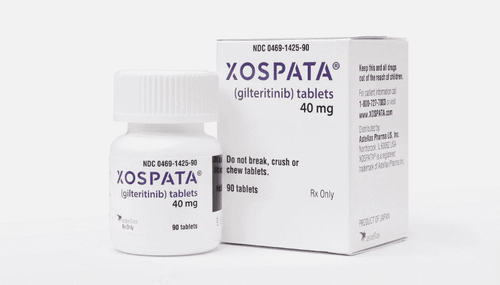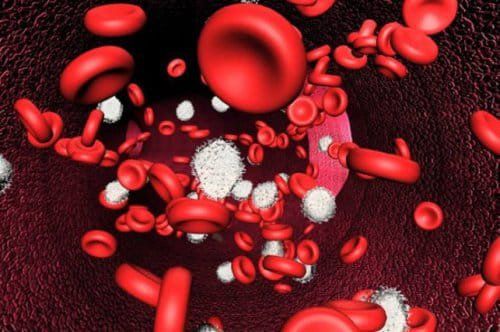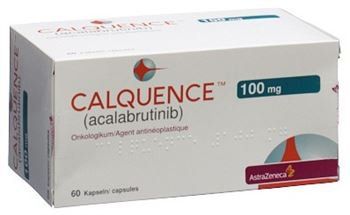This is an automatically translated article.
Cancer is a dangerous disease and is on the rise, one of which is chronic myeloid leukemia. To treat this disease, the oncologist may prescribe Asciminib to the patient. So what is Asciminib and how should patients use it?
1. What is Asciminib?
Asciminib is an active kinase inhibitor. Kinase is an enzyme that promotes cell growth with different types to control different stages of cell growth. Asciminib can slow cancer cell growth through inhibition of a specific kinase that should be used in the treatment of chronic myeloid leukemia.
2. How to take Asciminib
Asciminib is produced in the form of tablets to be taken orally on an empty stomach. Patients should not eat 2 hours before and 2 hours after taking Asciminib. At the same time, this product requires the patient to swallow the tablet whole, not to bite, crush or chew it. Asciminib can be taken 1-2 times a day, depending on the patient's condition. If you take Asciminib once a day and forget to take it by 12 hours, skip the missed dose and take your next dose according to your daily dosing schedule. If you take Asciminib twice a day and forget to take it for more than 6 hours, skip the missed dose and take your next scheduled dose.
It is important to ensure that the patient is taking the correct dose of Asciminib as prescribed. Before each dose, the patient should check that the amount of medicine he is about to take is in accordance with the doctor's prescription.
Asciminib blood levels can be affected by certain foods or medications, including grapefruit and grapefruit juice, Itraconazole, Diltiazem, Fluconazole, Verapamil, Rifampin, Bosentan, Efavirenz, Repaglinide, Midazolam, Cyclosporine, Digoxin, Tacrolimus .
3. Side effects of the drug Asciminib
Patients can apply some measures to control the side effects of Asciminib according to the doctor's instructions. Therefore, patients need to discuss with their doctor to find the most suitable remedy.
Some unwanted effects of the drug Asciminib
3.1. Hypercholesterolemia Asciminib may increase blood cholesterol levels of users. Therefore, the treating doctor will have a plan to monitor blood cholesterol levels throughout the patient's treatment.
3.2. Decreased white blood cell count and increased risk of infection White blood cells play a role in fighting infectious agents. During treatment with Asciminib, the patient's white blood cell count may decrease and lead to an increased risk of infections. It is important for patients to tell their doctor or nurse immediately if there are signs of an infection such as fever, sore throat, cold, trouble breathing, cough, painful urination, or slow-healing ulcers.
Some recommendations of doctors to limit infection while taking Asciminib:
Wash hands frequently for both the patient and those around them; Limit going to crowded places or contact with people who show signs of a contagious illness (such as having a cold, fever, cough, or living with someone who has these symptoms); Do not handle pet waste; Keep skin wounds or scratches clean at all times; Bathing, personal hygiene and regular dental care; Do not trim corners or ingrown fingernails/toenails; Talk to your oncologist before a dental procedure; Consult your doctor before getting any vaccines. 3.3. Decreased Platelet Count Platelets are part of the body's blood clotting process, so a low platelet count leads to a higher risk of bleeding. If you are taking Asciminib, tell your doctor if you have any unusual bruising or bleeding such as nose or tooth bleeding, bloody urine, etc. Platelet transfusion is the treatment if The patient's platelet count is too low.
Besides, the patient should also avoid some activities that can cause bleeding as follows:
Using a razor; Playing sports and engaging in high-contact activity that could cause injury or bleeding; Concomitant use of Asciminib with Aspirin or non-steroidal anti-inflammatory drugs (NSAIDs); Use dental floss or toothpicks; Brush your teeth with a toothbrush that is too stiff. 3.4. Anemia due to a decrease in the number of red blood cells Red blood cells are responsible for transporting oxygen in the blood to provide tissues in the body, so a low number of these cells will cause the organs to lack oxygen to function and express themselves. symptoms such as fatigue or lack of energy. You should inform your doctor if you have symptoms of anemia such as shortness of breath, fatigue or chest pain... during your treatment with Asciminib. In some cases, the red blood cell count is so low that a blood transfusion may be necessary.
3.5. Muscle pain Your doctor may recommend certain medications and other measures to help relieve pain during treatment with Asciminib .
3.6. Allergic reactions In some cases, patients may be allergic to Asciminib. Signs of an allergy may include generalized swelling, rash, difficulty swallowing, fever, heart palpitations, and difficulty breathing.
3.7. Nausea, vomiting Patients should talk to their treating physician so that they can receive medications to control nausea and vomiting associated with Asciminib use. In addition, some other measures may be helpful, such as changing the diet, limiting factors that can make nausea/vomiting worse (such as eating too many fatty, spicy, or fatty foods). Acidic).
3.8. Diarrhea Diarrhea can be a serious side effect of Asciminib. Patients should immediately notify the doctor if diarrhea begins to find out the appropriate intervention. Severe diarrhea can lead to dehydration so this side effect needs to be controlled as quickly as possible.
Oncologists may refer patients to medications to relieve diarrhea caused by Asciminib. In addition, patients can apply some measures to reduce diarrhea such as limiting the intake of high-fiber foods, using fresh fruits or vegetables, whole wheat bread, nuts and cereals. Soluble fiber can absorb liquid and help relieve diarrhea effectively, they are abundant in apple sauce, ripe bananas, canned fruit, oranges, boiled potatoes, white rice, french fries... In addition, patients should pay attention to drink enough water, limit alcohol or caffeine to prevent dehydration.
3.9. Hepatotoxicity The use of Asciminib can cause liver toxicity, so the treating doctor can monitor it through regular liver function tests. Patients should inform the doctor if there are symptoms of liver damage such as yellow skin, yellow eye conjunctiva, dark urine, right upper quadrant abdominal pain...
3.10. Other rare side effects Hypertension: Asciminib may cause the patient's blood pressure to rise. Therefore, patients should have their blood pressure checked regularly during treatment with this medicine. Any hypertensive condition requires appropriate treatment; uncontrolled blood pressure may require discontinuation of Asciminib treatment; Cardiovascular conditions: Asciminib can cause heart and blood vessel problems such as heart attack, stroke, blood clot formation, clogged arteries, heart failure, and arrhythmias. Contact your doctor or emergency center immediately if you have symptoms such as shortness of breath, chest pain, feeling fast heartbeat, swelling, dizziness, sudden weight gain, numbness or weakness on one side. body, vision loss, difficulty speaking, pain in the arms, legs, back, neck or jaw, severe headache or stomach pain; Pancreatic problems: Asciminib can increase blood amylase and lipase, which can be a sign of pancreatic problems. Patients should have their blood amylase and lipase levels checked while taking Asciminib. If you experience sudden stomach pain or experience severe discomfort, nausea or vomiting, you should call your doctor right away as these are signs of acute pancreatitis.
4. Effects on Reproductive Function of Asciminib
Exposure of the fetus to Asciminib can lead to birth defects, so patients should not become pregnant or father a child during cancer treatment with Asciminib. The use of effective contraception or birth control is essential, especially during treatment and for at least 1 week after the end of Asciminib therapy. Even if the menstrual cycle stops or the patient believes that he or she is not producing sperm, conception is still possible.
Note that the patient should not breastfeed while taking Asciminib and at least 1 week after the end of treatment.
Follow Vinmec International General Hospital website to get more health, nutrition and beauty information to protect the health of yourself and your loved ones in your family.
Please dial HOTLINE for more information or register for an appointment HERE. Download MyVinmec app to make appointments faster and to manage your bookings easily.
Reference source: oncolink.org













